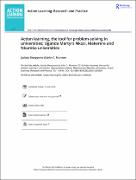| dc.contributor.author | Bwegyeme, Jacinta | |
| dc.date.accessioned | 2017-02-15T07:36:17Z | |
| dc.date.available | 2017-02-15T07:36:17Z | |
| dc.date.issued | 2015-03-15 | |
| dc.identifier.uri | http://hdl.handle.net/20.500.12280/384 | |
| dc.description.abstract | The article presents an account of how action learning principles were implemented to alleviate complex problems in universities. It focuses on the registrars and administrators under the academic Registrar's department. The Marquardt model of action learning was used in combination with the constructivist theories of learning, namely community of practice, experiential learning, discovery learning, problem-based learning and situated learning. The importance of culture and knowledge sharing is also highlighted. The results indicate that action learning contributes to problem-solving. The community of practice creates a conducive environment for successful implementation of action learning, and different organizational cultures impact on the implementation of action learning. | en_US |
| dc.language.iso | en | en_US |
| dc.subject | Action learning | en_US |
| dc.subject | challenges | en_US |
| dc.subject | problem-solving, university | en_US |
| dc.title | Action learning, the tool for problem-solving in universities; | en_US |
| dc.title.alternative | Uganda Martyrs Nkozi, Makerere and Nkumba universities | en_US |
| dc.type | Article | en_US |


